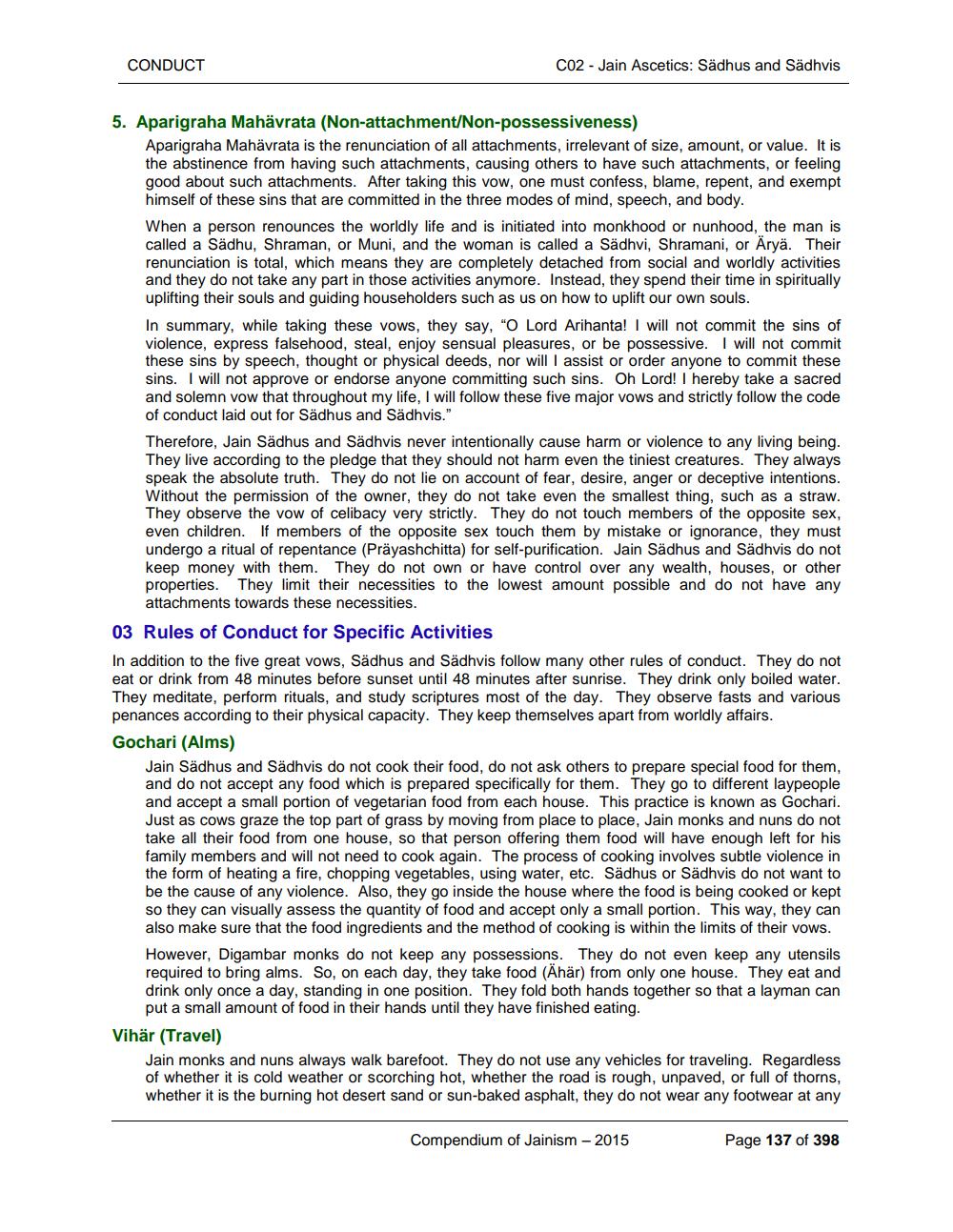________________
CONDUCT
C02 Jain Ascetics: Sädhus and Sädhvis
5. Aparigraha Mahävrata (Non-attachment/Non-possessiveness)
Aparigraha Mahävrata is the renunciation of all attachments, irrelevant of size, amount, or value. It is the abstinence from having such attachments, causing others to have such attachments, or feeling good about such attachments. After taking this vow, one must confess, blame, repent, and exempt himself of these sins that are committed in the three modes of mind, speech, and body.
When a person renounces the worldly life and is initiated into monkhood or nunhood, the man is called a Sädhu, Shraman, or Muni, and the woman is called a Sädhvi, Shramani, or Äryä. Their renunciation is total, which means they are completely detached from social and worldly activities and they do not take any part in those activities anymore. Instead, they spend their time in spiritually uplifting their souls and guiding householders such as us on how to uplift our own souls.
In summary, while taking these vows, they say, "O Lord Arihanta! I will not commit the sins of violence, express falsehood, steal, enjoy sensual pleasures, or be possessive. I will not commit these sins by speech, thought or physical deeds, nor will I assist or order anyone to commit these sins. I will not approve or endorse anyone committing such sins. Oh Lord! I hereby take a sacred and solemn vow that throughout my life, I will follow these five major vows and strictly follow the code of conduct laid out for Sädhus and Sädhvis."
Therefore, Jain Sädhus and Sädhvis never intentionally cause harm or violence to any living being. They live according to the pledge that they should not harm even the tiniest creatures. They always speak the absolute truth. They do not lie on account of fear, desire, anger or deceptive intentions. Without the permission of the owner, they do not take even the smallest thing, such as a straw. They observe the vow of celibacy very strictly. They do not touch members of the opposite sex, even children. If members of the opposite sex touch them by mistake or ignorance, they must undergo a ritual of repentance (Präyashchitta) for self-purification. Jain Sädhus and Sädhvis do not keep money with them. They do not own or have control over any wealth, houses, or other properties. They limit their necessities to the lowest amount possible and do not have any attachments towards these necessities.
03 Rules of Conduct for Specific Activities
In addition to the five great vows, Sädhus and Sädhvis follow many other rules of conduct. They do not eat or drink from 48 minutes before sunset until 48 minutes after sunrise. They drink only boiled water. They meditate, perform rituals, and study scriptures most of the day. They observe fasts and various penances according to their physical capacity. They keep themselves apart from worldly affairs.
Gochari (Alms)
Jain Sädhus and Sädhvis do not cook their food, do not ask others to prepare special food for them, and do not accept any food which is prepared specifically for them. They go to different laypeople and accept a small portion of vegetarian food from each house. This practice is known as Gochari. Just as cows graze the top part of grass by moving from place to place, Jain monks and nuns do not take all their food from one house, so that person offering them food will have enough left for his family members and will not need to cook again. The process of cooking involves subtle violence in the form of heating a fire, chopping vegetables, using water, etc. Sädhus or Sädhvis do not want to be the cause of any violence. Also, they go inside the house where the food is being cooked or kept so they can visually assess the quantity of food and accept only a small portion. This way, they can also make sure that the food ingredients and the method of cooking is within the limits of their vows. However, Digambar monks do not keep any possessions. They do not even keep any utensils required to bring alms. So, on each day, they take food (Ähär) from only one house. They eat and drink only once a day, standing in one position. They fold both hands together so that a layman can put a small amount of food in their hands until they have finished eating.
Vihär (Travel)
Jain monks and nuns always walk barefoot. They do not use any vehicles for traveling. Regardless of whether it is cold weather or scorching hot, whether the road is rough, unpaved, or full of thorns, whether it is the burning hot desert sand or sun-baked asphalt, they do not wear any footwear at any
Compendium of Jainism - 2015
Page 137 of 398




